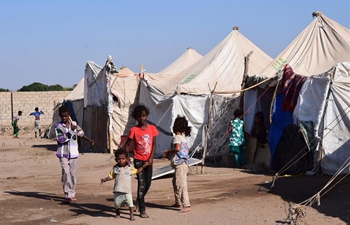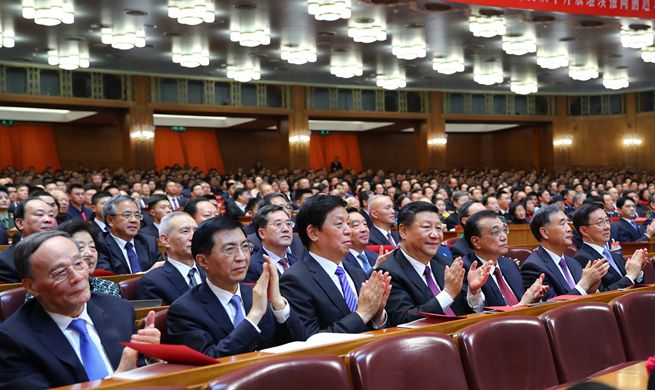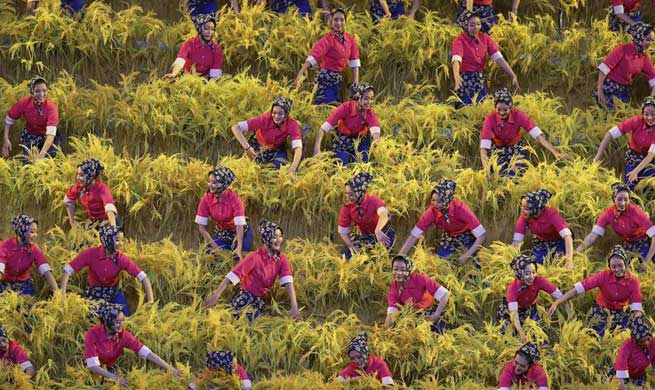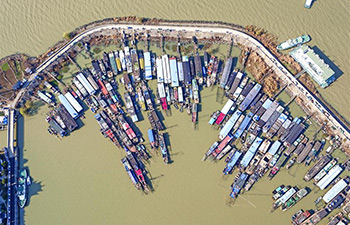TAIYUAN, Dec. 15 (Xinhua) -- Zhang Shaniu enjoys watching open-air plays, particularly the Yuju folk opera.
The 83-year-old remembers the plot of each show that has been staged in his village. The latest one, he says, was about bidding farewell to poverty.
The tiny village of Kongwang, tucked away deep in the mountains of northern Shanxi Province, has just won a long anti-poverty battle. By the end of 2017, the per capita annual income hit 6,100 yuan (890 U.S. dollars), way above the national poverty line. Food is now abundant. Life is good. And it is time to celebrate.
Like many people his age in China, Zhang has lived through one of the greatest stories in human history -- the world's most populous country went from rags to riches.
China maintained fast growth for four decades, avoided social turmoil and managed to let economic growth trickle down to benefit the population, solving governance issues commonly faced by developing countries.
The secret, experts say, is nothing other than the reform and opening-up policy which was launched 40 years ago and has since been developed and carried forward.
"IT'S THE ECONOMY"
In December 1978, the Communist Party of China (CPC) held a key meeting and decided to shift work priority to economic development, ushering in the era of reform.
At a time when planned economy was dominant, market forces were gradually introduced into the economy, creating private businesses in cities and dissolving communes in rural areas. Farm workers were allowed to keep the extra they produce on the contracted farmland.
Zhang's family contracted a 0.67-hectare farmland in 1978 and just in a year, they had harvested enough to eat. Three years later, he had saved enough to buy a radio.
Across China, enthusiasm among workers and peasants shot up, so did productivity.
China's economy grew by 9.5 percent a year on average between 1978 and 2017, and Justin Yifu Lin, a former World Bank chief economist, said this is a feat not matched by any other country in history.
In only 40 years, China has transformed from a poverty-stricken country to the world's second-largest economy.
"Why has China succeeded but others failed?" Lin often tossed this question to his audience in talks and lectures.
Experts say that the reasons are myriad: CPC pursues long-term continuous development instead of electoral victories, allows people to orderly take part in state governance via democratic centralism system, and explores a development path of its own other than the ones prescribed by the West.
"Development holds the master key. Turmoil stems from the lack of development and disrupts the development," said Hao Yongping, a professor at the Party School of the CPC Central Committee. "China's governance boosts growth and development while maintaining stability."
FOR PEOPLE
An ancient Chinese saying goes, "The key to running a country is to make its people better-off."
Zhang Chengfu, a professor of public administration at Renmin University of China, said he believes "the greatest strength" of China's governance lies in a ruling party dedicated to wholeheartedly serving the people and its people-centered philosophy of development.
"Economic growth is not for the mere accumulation of capital but for the well-being of the people," Zhang said. "That distinction sets socialism apart from capitalism."
China's reforms always target the areas in which people have most concerns or high expectations. By addressing these issues, authorities gain people's trust and support for its governance, the experts said.
When the reforms were first initiated in the late 1970s, the focus was on economic growth as authorities found that society's backward productivity could not meet people's rising material and cultural demands.
As society progresses and people's needs for a better life grow, corruption, pollution and unequal wealth distribution emerge as the top areas of concern for present reforms.
Kongwang is battling in China's epic fight against poverty, which is helping about 30,000 people out of poverty every day across the country.
Funding and know-how were provided to jump-start a mineral water plant, a gourd farm and a solar power station in the village. A 5-km paved road was opened. 4G Internet signals can be picked up.
To Zhang's delight, a large outdoor theater is also being built.
"Our village is rich now. We can put on shows as often as we want. No more waiting for opera fans," said Zhang Shuansuo, the village Party chief.
A GIFT TO THE WORLD
In 2012, Lin returned to teach at Peking University after his stint at the World Bank. He began to research on "new structural economics" based on China's development model and the experience of developing countries.
"It is very valuable for the developing world," Lin said. "Because it derives from the experience of developing countries and suits their needs."
Lin's students include foreign scholars and officials who come to study at the university's Institute of South-South Cooperation and Development.
The institute was created in 2016, with a goal to share governance experience among developing countries.
"China has achieved great progress after the reform. What they did and how they transformed are the reasons why I came here," said Said Haji Mrisho, head of Macroeconomic Unit under the Tanzanian Ministry of Finance and Planing who enrolled in a doctorate program.
Mrisho and his classmates -- coming from five continents around the world -- went on field trips from time to time. One of the recent ones took them to the Xiaogang Village, the birthplace of rural reforms in 1978.
"What they did was a remarkable thing for us to learn," he said. "We are all developing countries, so I can learn a lot from China as opposed to Western countries."
He Wenping, a research fellow at the Chinese Academy of Social Sciences, said China has managed to tactically handle stability, development and reform in its governance, offering valuable lessons for developing countries.
Mrisho said a key message he learned from China's reform is that countries need to explore their own development path.
"You cannot copy everything. You need to make modifications according to the local context," he said.
Malawian doctoral candidate Donasius Pathera said he believed China's development success comes from its confidence and its independent mind of deciding how to develop.
Those qualities are badly needed in countries which had been told what to do rather than doing things on their own, he said.

















